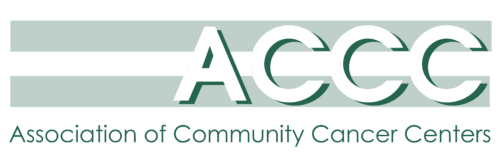SGO/ACCC Joint Education Collaborative: Optimizing Outcomes in Ovarian Cancer Using Personalized Medicine
Executive summary
SGO and the Association of Community Cancer Centers (ACCC) were awarded a joint independent medical education grant from AstraZeneca and Merck. Together, SGO and ACCC offered four accredited webinars (now available for on-demand listening) and additional non-accredited media presentations (podcasts, clinical reviews) on the topic of delivering personalized medicine in a community setting. Below are links to the resources developed during this year-long initiative.
nOW aVAILABLE
Best of ESMO Podcast
This episode features recent updates presented at the 2022 European Society for Medical Oncology (ESMO) Congress in Paris, France. SOLO1 study survival data, PAOLA data, and information about novel, early-phase drugs and their practice implications are reviewed by three speaker experts
Moderator: Ashley Stuckey, MD, Women & Infants Hospital Brown University
Speakers: Paul DiSilvestro, MD, Warren Alpert Medical School Brown University Women & Infants Hospital of Rhode Island and Care New England Health System, Premal Thaker, MD, Washington University School of Medicine, and Sarah Friedman, MD, Memorial Sloan Kettering Cancer Center.
“Ovarian Cancer Genetic Labs Physician/Patient Postcard”
Every patient with ovarian cancer should be offered testing aimed at informing targeted therapeutic decisions. This quick-reference, non-exhaustive guide provides a snapshot of germline and somatic testing options available for patients with ovarian cancer. Physicians and patients alike are encouraged to reference this PDF to printable postcard for more information about various labs, counseling options, and insurance information.
A round table discussion with a range of experts from academic centers to small community practice present examples of integrating palliative care in a variety of practice settings.
Moderator: Melissa Hardesty, MD, Alaska Women’s Cancer Care,
Speakers: Linda Smith, MD, Alaska Women’s Cancer Care, Kate Lally, MD FAAHPM, Dana Farber Cancer Institute, Carolyn Lefkowits, MD, MPH, UC Health Cancer Care, Lori Spoozak, MD, MHS, FACOG, FACS, University of Kansas, and Michael Pearl, MD, FACOG, FACS, FAAHPM, Stony Brook University Hospital.
“Conversations in The Clinic: Patient Perspectives on Genetic Testing” Podcast
Listeners will learn about the importance of genetic testing for ovarian cancer from a genetic counselor and a physician, and most importantly, from a patient.
Moderator: Ashley Stuckey, MD
Speakers Todd Tillmanns, MD, FACOG, West Cancer Center, and Leigha Senter-Jamieson, MS, LGC, Ohio State College of Medicine
“Perfecting Placement of PARPS: Preventing Progression of Ovarian Cancer Webinar”
In the fast-paced world of PARP inhibitor approvals in both the setting of maintenance and therapy in ovarian cancer, this panel of experts will assist practitioners to understand how to order germline and somatic testing for BRCA and HRD mutations. Speakers will discuss sequencing of PARP inhibitors as well as mitigating side effects. Additionally, they will discuss future directions for the use of PARP inhibitors as well as briefly discuss resistance to PARP inhibitors.
Moderator: John Farley, MD, COL, FACOG, FACS, Dignity Health – Cancer Institute, St. Joseph’s Hospital and Medical Center
Speakers: Premal Thaker, MD, MS, Washington University in St. Louis Siteman Cancer Center, Mary (“Maggie”) Mullen, MD, Washington University in St. Louis School of Medicine, and Todd Tillmanns, MD, FACOG, West Cancer Center
Podcast: Personalized Medicine in Ovarian Cancer: It’s Finally Time
This podcast focuses on individualized treatment in ovarian cancer. Case based scenarios are used to help facilitate discussion on targeted therapy for clear cell, low grade serous, and high grade serous ovarian cancers.
This webinar is dedicated to helping healthcare professionals treating patients with newly diagnosed ovarian cancer choose between neoadjuvant chemotherapy or upfront surgery. The webinar also reviews the role of secondary cytoreduction in patients with recurrent ovarian cancer.
New Antineoplastic Therapy Flashcards: Management and Treatment of Side Effects in Practice
Together, SGO and ACCC have created unique tools aimed at enhancing the delivery of personalized medicine in a community setting. The Chemotherapy & Targeted Therapy Subcommittee of the SGO Education Committee previously developed flash cards that highlight therapies which may be used less frequently and offer a “refresher” on dosing, side effects, contraindications, and more. This current batch of flash cards expands on this project and provides up-to-date information on some key drug options for patients with ovarian cancer.
Included in this resource are individual PDFs on the following:
- Niraparib
- Olaparib
- Pemetrexed
- Rucaparib
- Sorafenib
- Trametinib
Significant disparities in ovarian cancer exist across the spectrum of care. More specifically, decreased survival, advanced stage at diagnosis, adherence to guideline concordant care, and undergoing genetic testing all may be influenced by factors such as race/ethnicity, insurance status, socioeconomic status, hospital characteristics and rurality.
Speakers: Mazen Khalil, MD, St. Bernards Cancer Center; Jeffrey Hines, MD, University of Connecticut Health System; Mandy Gordon, APRN, St. Bernards Cancer Center; Todd Tillmanns, MD, FACOG, West Cancer Center; Leigha Senter, MS, LGC, The Ohio State University
Moderator: William Burke, MD, Stony Brook Medicine

